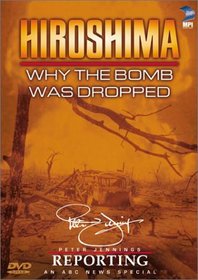| Actor: Peter Jennings Genres: Television, Educational, Documentary Sub-Genres: Television, Educational, History Studio: MPI HOME VIDEO Format: DVD - Black and White DVD Release Date: 11/26/2002 Original Release Date: 01/01/1996 Theatrical Release Date: 01/01/1996 Release Year: 2002 Run Time: 1hr 7min Screens: Black and White Number of Discs: 1 SwapaDVD Credits: 1 Total Copies: 1 Members Wishing: 0 MPAA Rating: NR (Not Rated) Languages: English |
Search - Hiroshima - Why the Bomb Was Dropped on DVD
  | Hiroshima - Why the Bomb Was Dropped Actor: Peter Jennings Genres: Television, Educational, Documentary NR 2002 1hr 7min Studio: Mpi Home Video Release Date: 11/26/2002 Run time: 70 minutes Rating: Nr |
Larger Image |
Movie DetailsSimilar Movies
Similarly Requested DVDs
|
Movie ReviewsDon't Overlook the Obvious: Keep It in Context Jonathan C. Marchant | 09/19/2006 (3 out of 5 stars) "If one were to focus on Truman's description of the atomic bomb as "the greatest thing in history" and NOT keep it in context with the Second World War, Give 'em Hell Harry would come across as a bloodthirsty warmonger to make Attila look like a boy scout - wait a minute, make that a "cub scout". It would serve to recall that despite Japan's attempt to negotiate an end to the war with the Soviet Union (with whom they had a non-aggression pact), Molotov under the strict direction of Stalin refused to even meet with the Japanese until after Hiroshima had been destroyed. When a meeting was finally sanctioned on August 8th, the Soviet message to Japan was a declaration of war, which promptly ended any further discussion.
On the evening prior to Hirohito's message ("We must bear the unbearable . . ") on the 14th of August, a group of relatively junior officers attempted a coup to prevent the broadcast of the emperor's decision to surrender; their position, in the spirit of Bushido, was to defend their home soil to the last man. Indeed, even after the formal surrender, there were still units fighting fiercely on the Asian mainland. Small cells of Japanese soldiers held out on islands in the Pacific for literally years, although most were isolated and refused to believe the "propaganda" that the war had ended. To grasp the enormity and gravemen of that time, and, consequently the political decisions that dictated the state of the world for generations to come, is not something that can be capsulized. Among a multitude of arguments, the arguments that conventional bombing precluded the need for a nuclear strike, or that an invasion of the Japanese mainland scheduled for November 01 would result in a million Allied casualties are grist for an academic mill, and will be debated for centuries. To conduct such debates along any moral guidelines is pointless: A conflagration that consumed no less than 55 million human beings is not a moral issue. It is an error in logic to try to make it so." |















